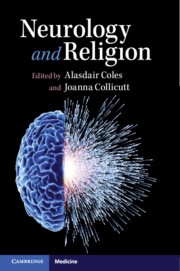Book contents
- Neurology and Religion
- Neurology and Religion
- Copyright page
- Contents
- Contributors
- Preface
- Part I The Neurological Study of Religion
- Part II Neurology and Religion
- II.I Clinical Conditions
- Chapter 9 Temporal Lobe Epilepsy, Dostoyevsky and Irrational Significance
- Chapter 10 Parkinson’s Disease, Religious Belief and Spirituality
- Chapter 11 Beyond Reasonable Doubt
- Chapter 12 Ramadam Fasting and Neurologic Disorders
- Chapter 13 Autism and the Panoply of Religious Belief, Disbelief and Experience
- Chapter 14 Personhood and Religion in People with Dementia
- Chapter 15 Religion and Frontotemporal Dementia
- II.II Therapy
- II.III Death and the Brain
- Bibliography
- Index
- References
Chapter 14 - Personhood and Religion in People with Dementia
from II.I - Clinical Conditions
Published online by Cambridge University Press: 28 October 2019
- Neurology and Religion
- Neurology and Religion
- Copyright page
- Contents
- Contributors
- Preface
- Part I The Neurological Study of Religion
- Part II Neurology and Religion
- II.I Clinical Conditions
- Chapter 9 Temporal Lobe Epilepsy, Dostoyevsky and Irrational Significance
- Chapter 10 Parkinson’s Disease, Religious Belief and Spirituality
- Chapter 11 Beyond Reasonable Doubt
- Chapter 12 Ramadam Fasting and Neurologic Disorders
- Chapter 13 Autism and the Panoply of Religious Belief, Disbelief and Experience
- Chapter 14 Personhood and Religion in People with Dementia
- Chapter 15 Religion and Frontotemporal Dementia
- II.II Therapy
- II.III Death and the Brain
- Bibliography
- Index
- References
Summary
It might seem natural to start with the assumption that everyone knows these days what dementia is. It is all around us as our populations age. Nevertheless, I shall start by setting out some basic facts about dementia. I do this not solely because there may be some who read this book without clear understanding of the medical facts about dementia, but also because the definition of ‘dementia’ is problematic. It is interesting to consider, albeit briefly, the implications of this problem, because I think they point us in two directions: towards the recognition of difference and the importance of the individual; and towards an understanding of the relevance of context. I shall then consider some of the literature that describes the neuroanatomical basis of syndromes associated with religion in the context of dementia. This neurological understanding of religion in dementia has to be set alongside the religious experience of living or working with dementia, which I shall discuss in the third section of the chapter. In the fourth, I shall suggest that some linkage between the neurological and experiential accounts of dementia might be found by considering lucid episodes, which raise profound questions about meaning and selfhood. This will lead me, in the fifth section, to discuss the importance of meaning and the broad view of personhood which can be derived from our account of meaning. In the final section, I shall discuss the implications of such a view for our understanding of religion and dementia.
- Type
- Chapter
- Information
- Neurology and Religion , pp. 149 - 160Publisher: Cambridge University PressPrint publication year: 2019
References
- 1
- Cited by



